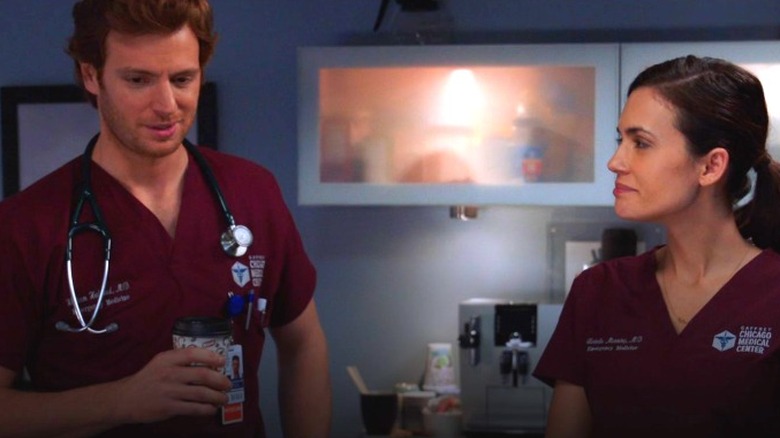Why Chicago Med's Reunion Episode Was More Concerning Than You Realized
As usual with NBC's hit drama "Chicago Med," there are a number of gripping medical crises and interpersonal issues with the staff happening all at once on the show's Season 1 episode "Reunion." One of those crises involves 13-year-old Michelle (Maisie Merlock), who's rushed into the emergency department at the show's fictional Gaffney Chicago Medical Center experiencing serious respiratory symptoms.
When the often-controversial Natalie Manning (Torrey DeVitto) prepares to treat Michelle, she's told by the girl's father that his daughter's history of multiple symptoms is due to her longtime struggle with mitochondrial disease. The father also mentions he recently lost his wife. Then, when he steps away and Michelle recovers her ability to breathe once he's gone, Manning appears suspicious that the father's claim of mitochondrial disease, or mito, is masking something else. A short time later, Manning describes the case to colleague Dr. Will Halstead (Nick Gehlfuss), who seems to agree with her that mito isn't a "real" disease at all, but a medical cop-out employed by lazy doctors unable to form a more accurate diagnosis of a patient's condition. With this information in hand, then, what makes the "Reunion" episode of "Chicago Med" more problematic than you may have realized?
The Reunion installment of Chicago Med misses the mark medically
As the episode progresses, Chief of Psychiatry Dr. Daniel Charles (Oliver Platt) opines that rather than mitochondrial disease, Michelle actually has Conversion Disorder, defined by the Mayo Clinic as producing "symptoms that can't be explained by a neurological disease or other medical condition." In other words, the girl is presenting psychosomatic symptoms, which Charles attributes to her wanting to do something, anything, to distract her father from his sadness over the death of his wife.
As noted in a Forbes article written by Infectious Disease specialist Judy Stone, this on-screen dismissal of mitochondrial disease as more or less fictional seriously disrespects patients suffering from the often-dire complications of this rare but very real malady. As Stone wrote, in the aftermath of the episode airing, "There was considerable outrage from the mito community on NBC's Facebook page." Stone went on to say that she'd asked NBC to apologize or present an accurate picture of the disease in another episode, but was told by the network that "We don't comment on our fictional storylines for our series programs." So, while no less an authority than the Mayo Clinic accepts mito as a bona fide disease, it appears NBC and "Chicago Med" are electing to stick with their concerning decision to label it as being all in a patient's mind.

